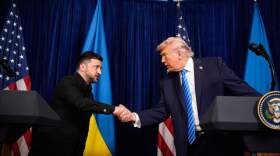ARI SHAPIRO, HOST:
For a bit more context on the State Department dissent cable, I'm joined by John Brady Kiesling. He spent two decades at the State Department and signed dissent cables during his time there. One of them was a push for intervention in Bosnia. It earned him an award for constructive dissent from the American Foreign Service Association. John Brady Kiesling, welcome to the program.
JOHN BRADY KIESLING: Thanks for having me.
SHAPIRO: This memo criticizing President Trump's executive order has reportedly been signed by close to a thousand State Department staff members. How unusual is that?
KIESLING: Completely unusual. It's never happened before. I think the previous record must be around 50.
SHAPIRO: That's quite a jump from 50 to a thousand.
KIESLING: It reflects a direct challenge to the professionalism of the State Department and to the idea that the State Department is an institution that knows what it's doing and does it.
SHAPIRO: Explain what you mean by that.
KIESLING: Terrorism has been on the landscape for over a hundred years. The United States government has been protecting the U.S. borders for even longer than that. A system has evolved. It's not a perfect system, but it's pretty good. And it's staffed by professionals who are absolutely committed to protecting their country.
Now you have basically a group of idiots who have no idea how the world works who've come in and said, whatever the previous administration did can't possibly have worked; we're going to change it basically by kicking in the teeth everyone who's worked for a lifetime to protect the U.S.
SHAPIRO: That's very strong language.
KIESLING: But it's true.
SHAPIRO: The White House press secretary, Sean Spicer, said that dissenting State Department staff should get with the program, or they should go. What's your reaction to that as a former diplomat?
KIESLING: He does not understand that the American Foreign Service consular service is a bunch of experts highly trained to do a very specific job that needs to be done. And they will do that job. They will follow the orders they are given. But destroying the mechanism that protects the United States because people are disloyal - that's stupid.
SHAPIRO: You ultimately resigned from your position in protest against the Iraq war. It sounds like you followed Sean Spicer's instruction, get with the program or go. You decided to go.
KIESLING: Exactly. In my case, I was being asked to promote the Iraq war. I could not in good conscience go out and promote that war. And so I had a moral obligation to quit, and I did.
In this case, there is no moral obligation to issue visas against the instructions from the White House. There is simply a professional obligation to let the White House know that the White House's policy is going to hurt the United States.
SHAPIRO: Donald Trump campaigned, and people voted him into office. Why shouldn't he go through with what he promised to do? After all, diplomats around the world are not elected officials. They were not voted into power.
KIESLING: President Trump promised to make the American people safe. He needs to understand, what are the motives and mechanisms that generate terrorism? What are the ways that put dangerous people close to Americans with the tools to kill them? The State Department, the CIA, the Pentagon have been studying exactly this issue ever since the mid-1960s at least. They have learned something in the process. Before he stomps all over the system, let him find out why the system does what it does.
SHAPIRO: John Brady Kiesling is a former U.S. diplomat. Thank you for joining us.
KIESLING: Thank you for inviting me. Transcript provided by NPR, Copyright NPR.





